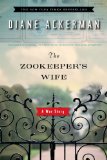Summary | Excerpt | Reading Guide | Reviews | Beyond the Book | Readalikes | Genres & Themes | Author Bio

A War Story
by Diane Ackerman
Lutz Heck soon began ministering to a handful of European bison, including those
he stole from the Warsaw Zoo, hoping that they might prosper in Bial/owiezÿa’s
spirit-house of trees, just as their ancestors had. Heck envisioned forest bison
once again galloping along the trails, as sunlight speared through branches of
hundred-foot oaks, in a woodland throbbing with wolves, lynx, wild boar, and
other game, soon to be joined, he hoped, by herds of ancient horses.
Heck also sought a legendary bull, the aurochs, once the largest land animal in
Europe, known for its savagery and vigor. When Ice Age glaciers melted, about
twelve thousand years ago, most giant mammals vanished, but in the cold forests
of northern Europe, some aurochsen survived, and all modern cattle have
descended from those few—not that aurochsen would have been easy to domesticate
eight thousand years ago. Because the aurochs went extinct in the 1600s, recent
in evolutionary terms, Heck felt sure he could reconstruct it, and in so doing
save it, too, from "racial degeneration." He dreamt that, alongside the
swastika, the bull might become synonymous with Nazism. Some drawings of the era
showed the aurochs and a swastika joined in an emblem of ideological suavity
combined with ferocious strength.
Many ancient cultures worshipped the aurochs bull, especially in Egypt, Cyprus,
Sardinia, and Crete (whose transspecies ruler supposedly descended from a sacred
bull). Zeus often assumed the shape of a bull in Greek myth, the better to
ravage alluring mortals and produce offspring with magical gifts; when he
abducted Europa, it was in the guise of an aurochs, a great black bull with
short beard and giant forwardpointing horns (like those on long-horned cattle,
or on the helmets of heroes in the Nibelungen). What better totemic animal for
the Third Reich? Heck’s passion for the project was shared by top Nazi
officials, making it clear that Heck’s work was not just about the re-creation
of extinct species. After Hitler came to power, the biological aims of the Nazi
movement spawned many projects to establish racial purity, which justified acts
of sterilization, euthanasia, and mass murder. One of the Third Reich’s key
scientists, Heck’s colleague and good friend Eugene Fischer, founded the
"Institute of Anthropology, Genetics, and Eugenics," which favored Josef Mengele
and other equally sadistic SS doctors who used concentration camp inmates as
guinea pigs.
Fascinated by violence and the red-blooded manly spirit—naturally brave, daring,
fierce, hardy, sane, lusty, strong-willed—Eugene Fischer believed that mutations
in human beings were as destructive as those in domestic animals, and that
interbreeding was wilting the human race in the same way that it had already
denatured certain "beautiful, good, and heroic" wild animals, losing the potent
original in the genetic clutter. The roots of Nazism fed on a lively occultism
that spawned the Thule Society, the Germanenorden, the Völkisch movement,
Pan-Germanism, and other nationalist cults that believed in a race of Aryan
god-men and the urgency of exterminating all inferiors. They exalted superhuman
ancestors, whose ancient gnostic rule had brought the Aryans wisdom, power, and
prosperity in a prehistoric age until it was supplanted by an alien and hostile
culture (namely, Jews, Catholics, and Freemasons); these ancestors were supposed
to have encoded their salvation-bringing knowledge in cryptic forms (e.g.,
runes, myths, traditions), which could be deciphered ultimately only by their
spiritual heirs.
This ideal of racial purity really bloomed with Konrad Lorenz, a Nobel scientist
highly respected in Nazi circles, who shared Oswald Spengler’s belief
popularized in The Decline of the West (1920) that cultures inevitably decay—but
not Spengler’s pessimism. Instead he turned to the domestication of animals as
an example of how cultures decline, through haphazard breeding of robust and
humdrum stock, and championed a biological solution: racial hygienics, a
"deliberate, scientifically founded race policy" in which ruin is prevented by
the elimination of "degenerate" types. Lorenz used the terms species, race, and
Volk interchangeably and warned that "the healthy volkish body often does not
‘notice ’ how it is being pervaded by elements of decay." Describing that decay
as the cancer of a physically ugly people and arguing that each animal’s goal is
the survival of its species, he invoked an ethical commandment he claimed the
Bible supported—"Thou shalt love the future of your Volk above all else"—and
called for dividing people between those of "full value" and those of "inferior
value" (which included whole races and anyone born with mental or physical
disabilities), purging the feeble, both in humans and animals.
Reprinted from The Zookeeper's Wife by Diane Ackerman. Copyright (c) 2007 by Diane Ackerman. With permission of the publisher, W.W. Norton & Company, Inc.
Your guide toexceptional books
BookBrowse seeks out and recommends the best in contemporary fiction and nonfiction—books that not only engage and entertain but also deepen our understanding of ourselves and the world around us.